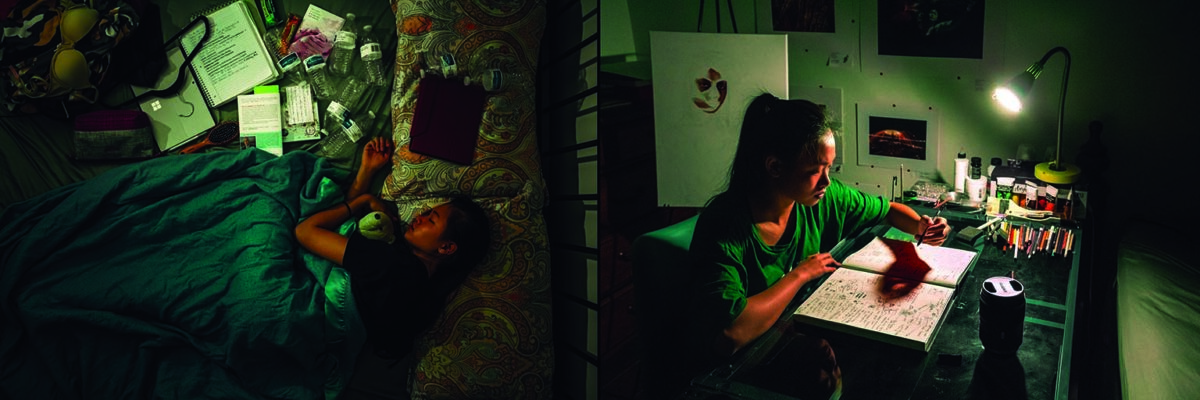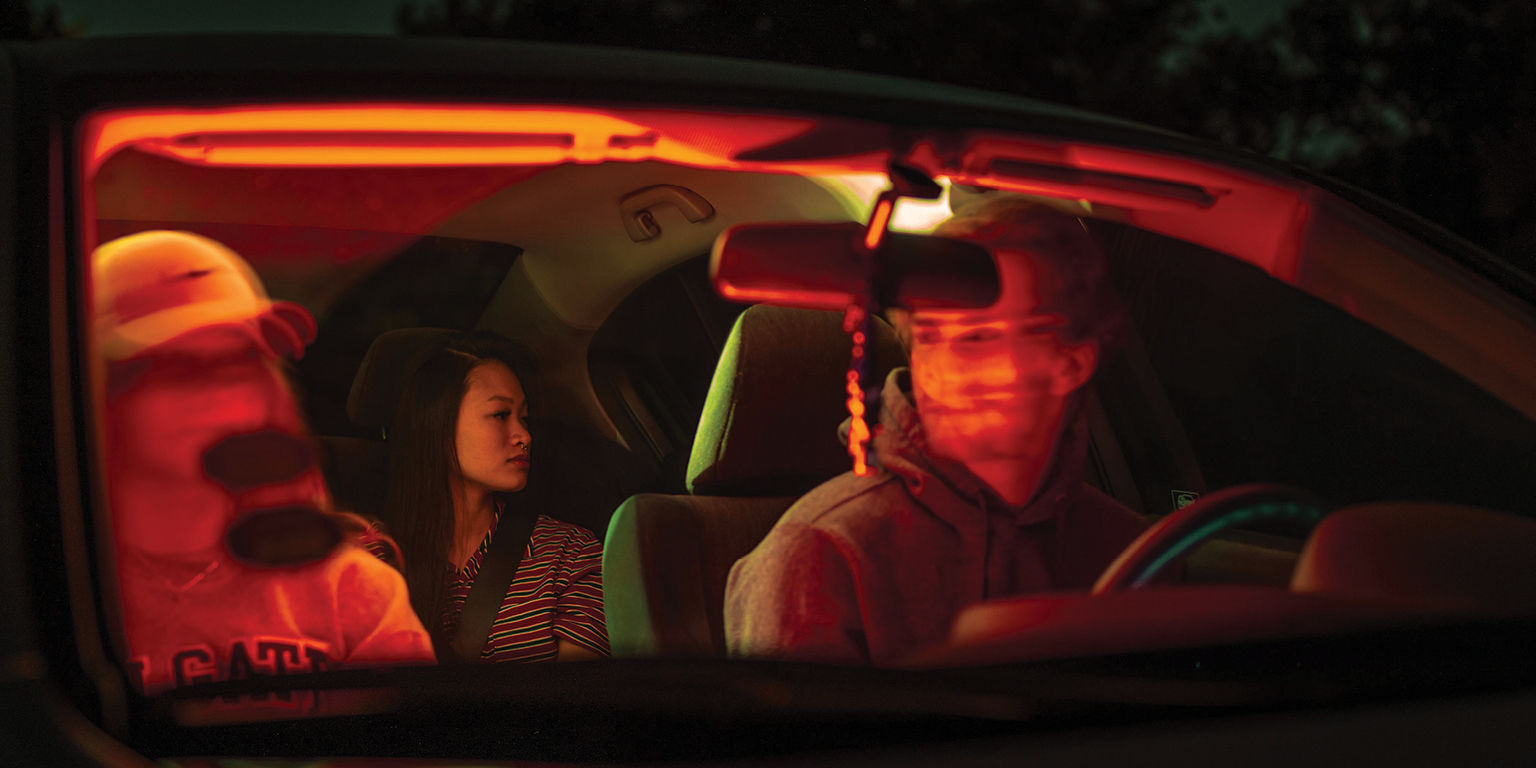Alyvia Luong and Caroline Dinh were both awarded the highest honor in the 2021 Scholastic Awards: the Gold Medal Portfolio Award! Keep reading to learn more about them and to view some of their winning works.
For Alyvia, her art is meant to elicit strong emotions from the viewer. As she says, “[w]hen I can’t find the words to verbally communicate something, photography serves as my interpreter.” The works in Caroline’s writing portfolio are “a collection of pieces demonstrating that computing is art, programming is poetry, and science and storytelling are one and the same.” She uses words “to capture human vulnerability between the lines of a formula or the language of a machine.”
Alyvia Luong
“I primarily focus on incorporating symbolism and personal voice into my work, and I create art with the intention of expressing myself while provoking raw emotion in whomever my spectator may be. From my vantage point, art is a vessel for story-telling and introducing new perspectives. Personally, I find myself drawn to photos that speak through strong imagery and capture emotion well. Atmosphere, facial expressions, and composition all play a massive role for me. Because I tend to gravitate to these types of photos, my work is often allegorical. It is a consistent motif I maintain, and it performs as a major component in most of the content I produce.”

Caroline Dinh
“Science and technology provide such a vast pool of concepts to capture and metaphorize: using the paradox of quantum entanglement, I point out our hubris. Through the variables of a CSS stylesheet, I juxtapose the mythical and the mundane. Between the redox reaction for rusting copper, I critique the glory of the American Dream. In my writing, I’m free to experiment—my notebooks and Google Docs are lab journals documenting the mad science I share with you today.”
DEPLOY
Caroline Dinh, Science Fiction & Fantasy. Grade 12, Richard Montgomery High School, Rockville, MD. Gold Medal Portfolio, Salesforce Writing Portfolio
The wait is always the worst, they say, especially before collapsing a star.
Pallas took a breath and focused on the countdown. T-minus ten seconds: there were no signs of life in its orbit. There were seven planets to survey, all of them circling Star 64b; the biologists had checked and checked again that not even the tiniest microbes wriggled on any of them. The xenozoologists had confirmed that no creature called this system home.
Pallas had asked, a thousand times over, just to be sure. And they were sure, or as sure as scientists could ever be. She would just be blowing up a bunch of rocks. That’s all. Obliterating a ball of gas that nobody called a sun.
It would not do to accidentally commit genocide simply for a nuclear test.
T-minus nine seconds: she’d rehearsed this. Over and over and over, she’d rehearsed deploying destruction; entering one line into her computer’s command prompt to simulate the sol-nuclear bombing. It wasn’t as fancy as it sounded. It was simply a second’s pause before her screen outputted DEPLOY SUCCESSFUL and the program ended. She knew the command like a knot around her ring finger, tugging at her knuckles until she found herself tapping it out on her coffee table or her steering wheel when she drove to work. The only thing she hadn’t rehearsed was the nine-year wait that would follow.
T-minus eight seconds. T-minus seven. At t-minus six seconds, a history lesson flashed through her mind—a story she’d been told for years since she was young, starting with this quote attributed to Albert Einstein: I do not know with what weapons World War III will be fought, but World War IV will be fought with sticks and stones. The Terran physicist was right about a lot of things, her teachers had told her, but not about this—his planet never saw a Third World War, only expansion, exploration, excelsior. By the time another war rolled around, it wasn’t confined to just one world.
T-minus five seconds. T-minus four. As millennia of history broke like a cold tide over her shoulders, Pallas’s knees trembled with the flood; with a stroke of her finger, a single stroke of that skinny index finger with the chipped nail and dull polish would cause an entire planetary system to explode.
Relax, chided her manager, it’ll be just like flicking a domino, only, this domino was a space drone that would launch a high-speed particle into the heart of a star, and somehow it would trigger reaction after reaction until the whole damn thing blew up. Was it possible to have an existential crisis in the span of a millisecond? Pallas wasn’t sure if she—a sack of atoms on a tiny speck of rock—was ready to wipe a planetary system from existence. All this damage and in the grand scheme of the universe, she wasn’t even worth a quark.
T-minus three seconds. T-minus two. Pallas swallowed. Surveyed the faces of the scientists before her, eyes tracking in fervent anticipation her every move. It was only a small conference room, and Pallas had lectured before audiences ten times this size before, but she couldn’t remember ever being so anxious for anything. Although the walls were lined with monitors, statistics shooting over every screen, all eyes were on her and her little laptop computer with its faded stickers and sticky keys.
T-minus one. The last thing Pallas thought about before detonating the bomb was her boys. Merc and Mars. She’d left them at home earlier that morning, headsets on and ready for another day of school. They were good. Their teachers told her that they always paid attention in class, unless they were bickering, which happened rather frequently in the household but apparently less often in the classroom. They got good grades. Merc wanted to build spaceships when he grew up; Mars wanted to fly them.
They would be waiting for her that evening when she got home from work. If she was lucky, they would’ve done some of the chores—taken out the trash or cleared the table for dinner—and so she’d heat up some leftovers and ask them about their days. “Fine,” they’d say, and they always were fine. After they asked about hers, Pallas would pause over a forkful of broccoli and tell them that her day went fine as well.
It would be fine.
Pallas swallowed. Closed her eyes. The command was already typed onto the screen; all she had to do now was hit ENTER.
She did, and then it was done. No bang, no blinding light, no indication that anything had happened at all save for the little DEPLOY SUCCESSFUL that she’d come to know so well. Pallas’s lungs unclenched and she sank back into her seat as the scientists around her erupted into applause.
Somewhere in the universe, a star was erupting. Or not. Star 64b was nine lightyears away and for all Pallas knew, the test could have failed. Pallas didn’t know if that was better or worse, but she wouldn’t find out for almost a decade, anyway. She wondered where she would be when the news finally got to her; maybe she’d be having dinner with her sons. She couldn’t imagine what they’d look like at that point in time, but somehow she thought that she would be exactly the same.
At T-plus one minute, or rather T-minus nine years, Pallas began waiting all over again.
Featured image: Alyvia Luong, Should’ve listened to instinct., Photography. Grade 12, Carroll High School, Fort Wayne, IN. Gold Medal Portfolio, The Maurice R. Robinson Fund Art Portfolio
To see more Gold Medal Portfolio recipients, past and present, visit our Eyes on the Prize series.

